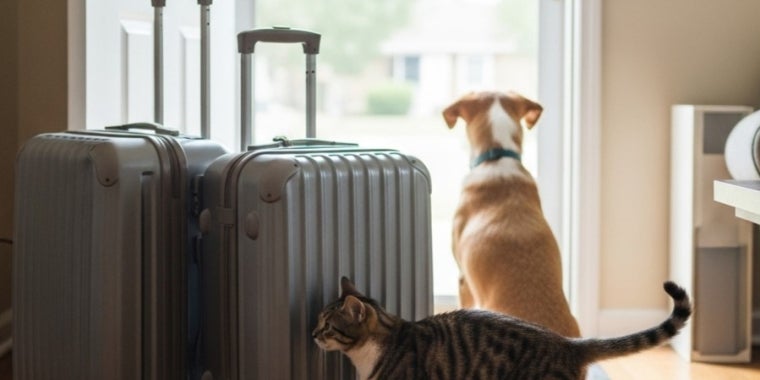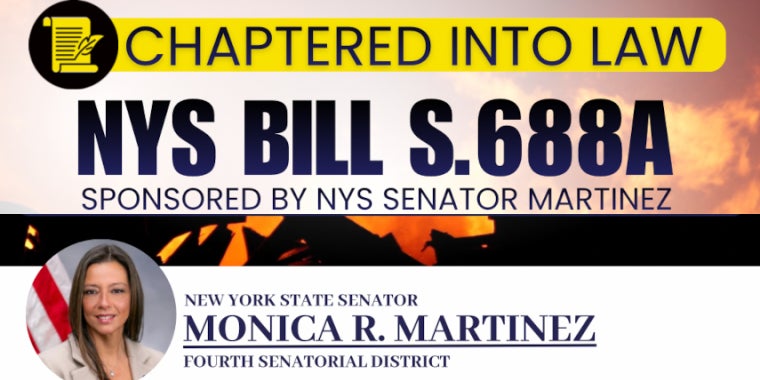
Leaving Nothing Behind
May 22, 2025

New York State’s Senate has passed legislation (S896) requiring local emergency management plans to include preparations for accommodating animals. The proposal sponsored by state Sen. Monica R. Martinez would enhance local comprehensive emergency management plans by requiring the identification of animal-friendly temporary housing and facilities during evacuations. It also calls for establishing partnerships with animal shelters, societies for the prevention of cruelty to animals, and veterinary services to support emergency responses involving animals.
"Disaster planning that leaves animals behind is planning that leaves humans behind too,” said Sen. Martinez. “This legislation recognizes the deep connection between people and their pets and takes real steps to make sure no one is put in the impossible position of abandoning a beloved companion in a moment of crisis. By requiring local emergency plans to include animal accommodations, this bill will help save lives and strengthen how communities prepare for and respond to emergencies."
In January, massive wildfires that killed 30 people and burned over 18,000 structures in the Los Angeles area brought national attention to the issue of pet evacuation procedures following the discovery of an 85-year-old victim who died in a car parked outside her of home after declining to evacuate because she refused to abandon her dog, turtle, canary and two parrots.
The proposal still needs to be approved in the Assembly, where it is being sponsored by Assemblywoman Alicia Hyndman, and signed by the governor before being enacted.
Earlier this year, the New York State Senate passed Sen. Martinez’s Tucker’s Law (S197), a bill granting judges discretion to impose consecutive sentences when an individual is convicted of multiple counts of aggravated cruelty to animals. Currently, the law caps sentences at up to two years, even for the most egregious acts. Legislation expanding the definitions of wild and exotic animals (S252) was also approved to help protect these creatures from being imported, sold or owned. That proposal was filed in response to a Hauppauge pet store found to be selling various exotic animals. The shop allegedly allowed visitors to purchase 30-minute sessions to pet, feed and interact with wild and exotic animals, including sloths and kangaroos. Under current law, selling or keeping these types of animals is not prohibited, but the shop was closed last year following court orders for alleged town code violations. A third proposal (S1741) increases the minimum penalty for abandoning an animal, ensuring that those who leave pets behind face fines of at least $500.
Additional animal protection bills sponsored by Sen. Martinez still pending in the Senate include:
- S673 – Housing People and Animals Together Grant Program: This bill creates a grant program to fund shelters and organizations that provide emergency housing and domestic violence shelters for both people and their companion animals, ensuring that no one has to choose between housing and their pet.
- S1742 – Increasing Penalties for Inadequate Shelter for Dogs: This bill strengthens penalties for failing to provide proper shelter for dogs left outside in extreme weather, ensuring that neglect is met with consequences.
- S1743 – Granting SPCA Officers the Authority to Enforce Animal Cruelty Laws: This bill grants SPCA peace officers the same authority as police officers to issue appearance tickets, summons, or arrests for violations of animal cruelty laws.
- S7612 – Statewide Co-Shelter Toolkit for Housing Providers: This bill creates a co-shelter best practices toolkit to help shelters, housing providers, and municipalities support people experiencing homelessness and survivors of domestic violence with their companion animals, making it easier to implement and sustain pet-inclusive housing programs.
Several of these proposals are expected to come up for a vote before the end of the legislative session next month.



